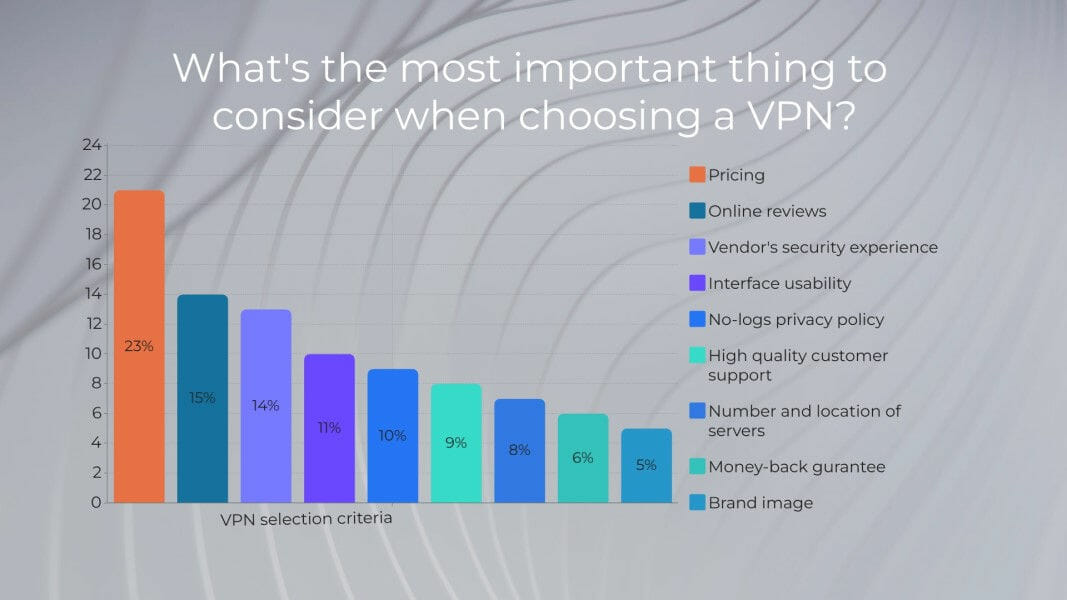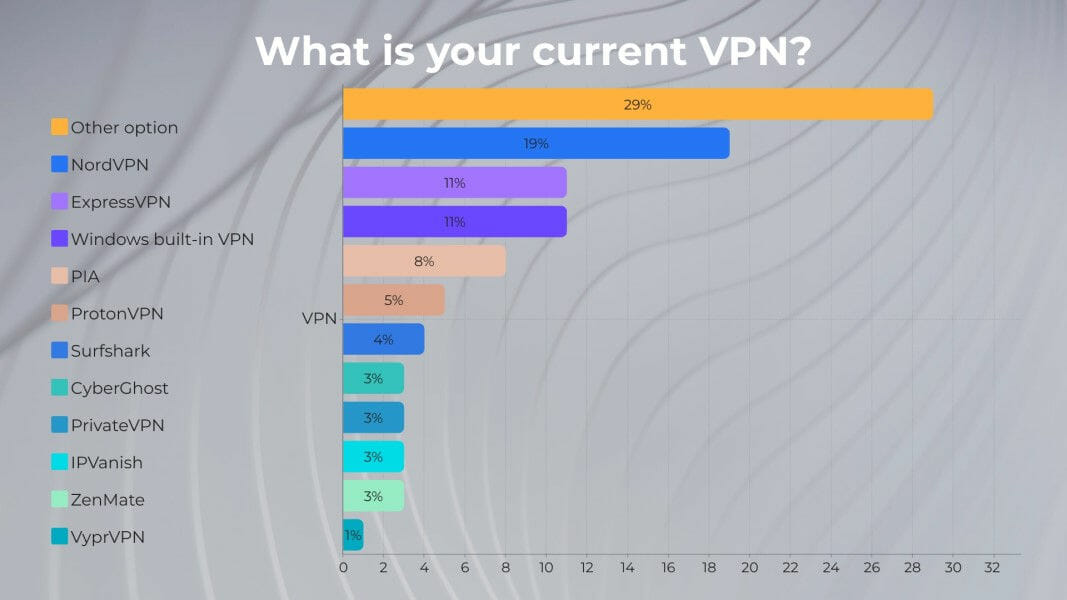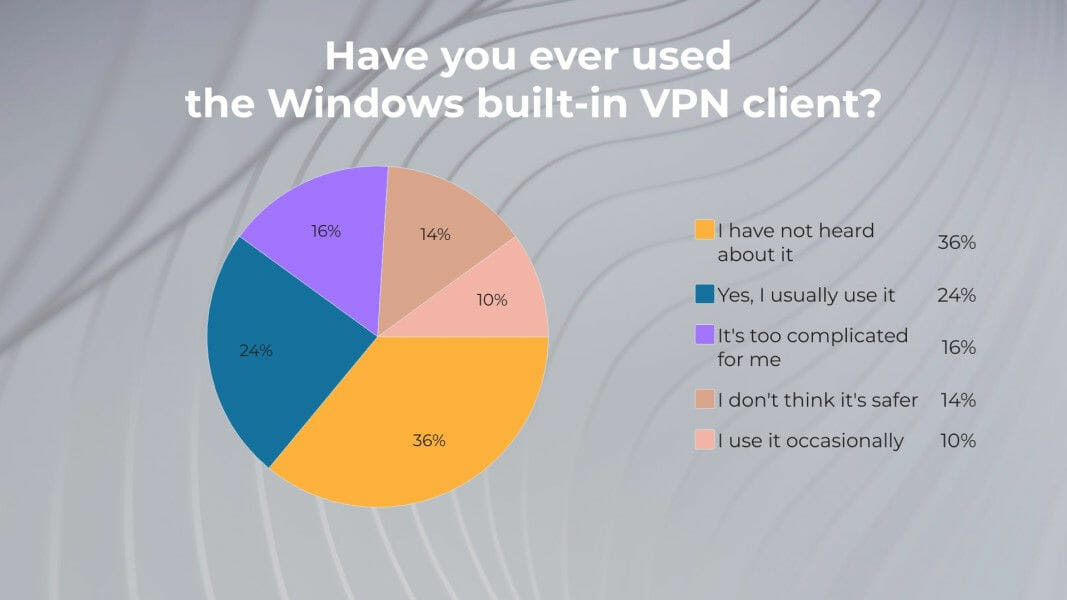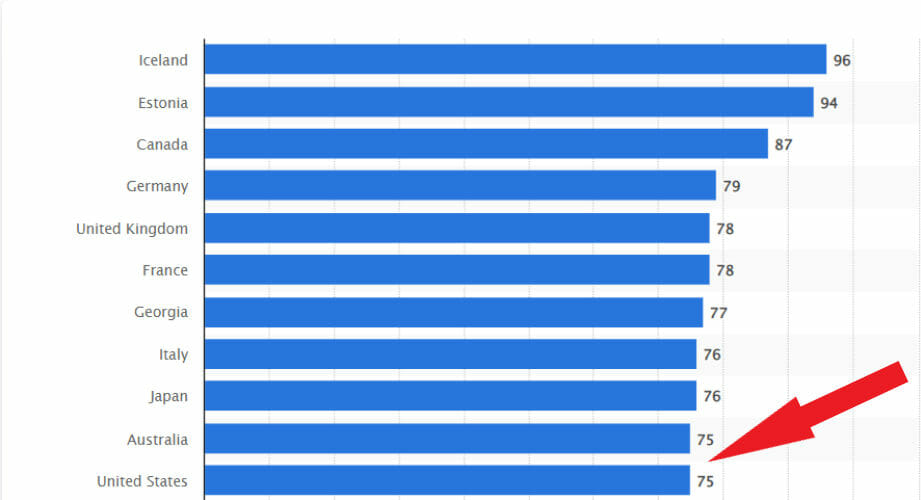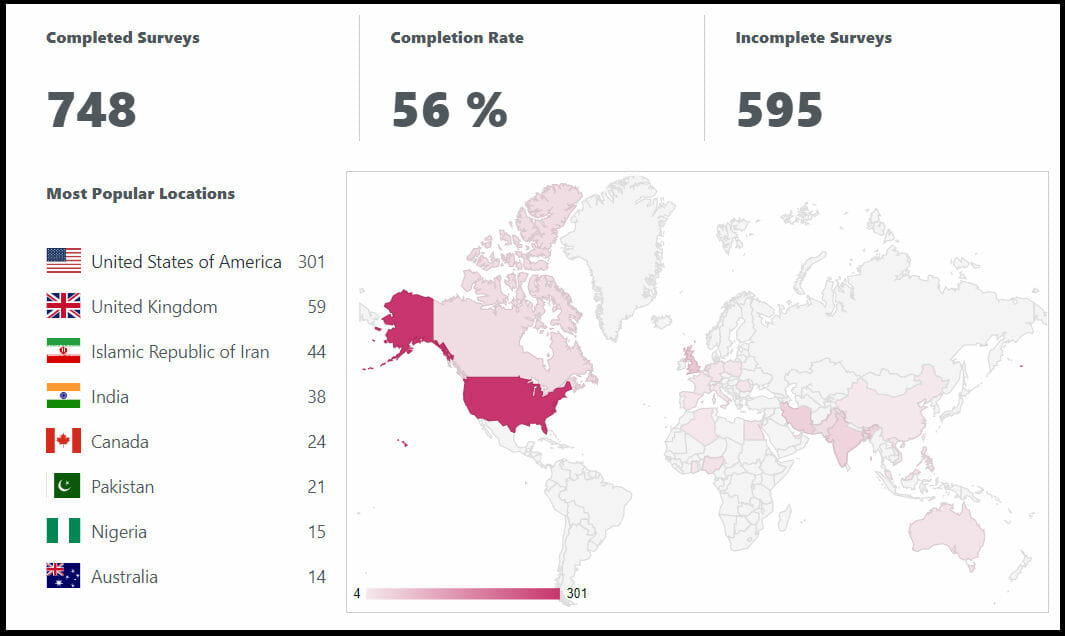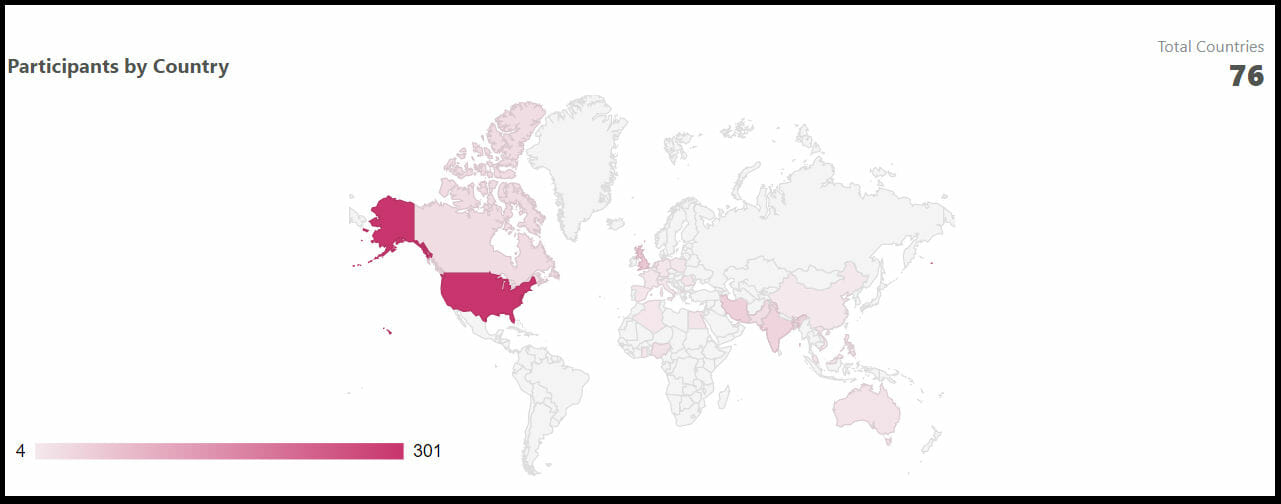Exclusive survey: VPN popularity goes down as prices go up, our study reveals
Here are the top five takeaways from our just-completed survey:
- Pricing dictates the VPN choice for most users
- VPN usage is implicit for more than 40% of respondents with half them using it on all their gadgets
- Industry-leading NordVPN, ExpressVPN, and PIA claim more than a third of the VPN market share
- When it comes to browsers with built-in VPNs, Opera steals the scene
- Almost a quarter of the polled netizens use the Windows built-in VPN on a daily basis
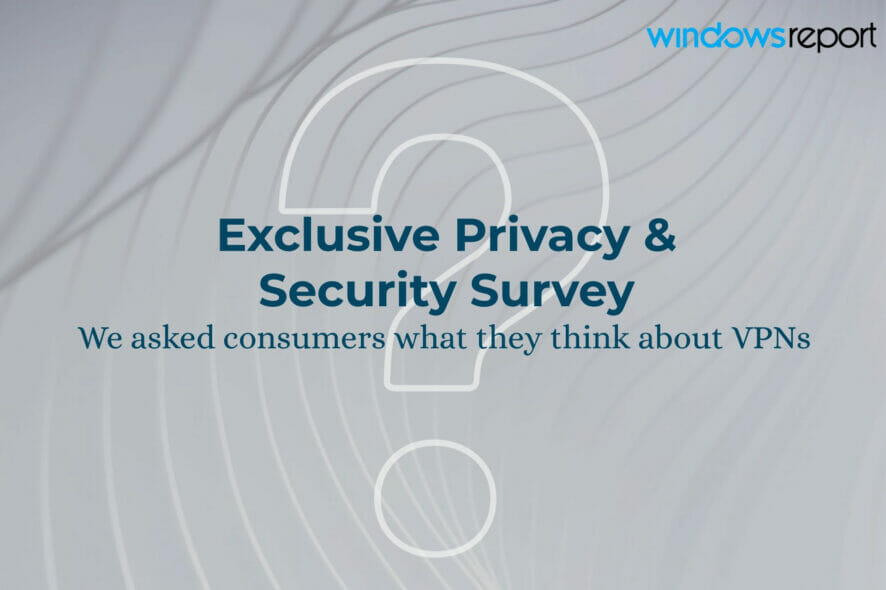
The following research has been compiled from the opinions of 748 readers who completed our opt-in online survey over the course of 3 weeks. Almost 55% of answers were recorded from the USA and UK, while the next most popular countries were Iran, India, and Canada. Their unaltered answers are presented below.
After a few unfortunate design decisions (remember Windows 8?), Microsoft decided to integrate users’ feedback, and their valuable input helped shape the current magic formula.
Thanks to Windows 11, the Redmond giant seems to be on the right path to strike gold, with many people enjoying its fresh and modern look and feel.
We did not miss the opportunity to showcase users’ unfiltered opinions in our previous survey regarding Windows 11’s appearance and it became quite clear to us that a big chunk of Windows aficionados is ready to take the next step.
With 65% of Win 7 users thrilled about the upgrade prospect, it’s safe to say that Microsoft nailed the design this time.
But where does that leave privacy and security? How do people feel about the enhancements in this area? Let’s find out together!
Pricing is the number one reason for choosing a VPN
Money makes the world go round and VPNs cannot elude the status quo. A big chunk of inquired users stated that price is the most important thing to consider when choosing a VPN.
In fact, out of 60% of respondents who don’t use a VPN at all, 27% claim that it is simply too expensive to install one.
Should privacy be free? Many of our respondents seem to think so
Half of the polled users think that privacy should be widely available without a price tag and that they should not be obliged to open their wallets in order to benefit from intimacy when going online.
Most of them consider that VPN services are too pricy, to begin with. Nevertheless, as much as 16% of users are willing to pay more than 25$/year for a VPN.
40% of respondents have a VPN, half of them use it on all their devices
VPN usage share has spread like wildfire among privacy-aware netizens and has now reached a staggering percentage. 42% of our respondents already use a VPN, but here’s the interesting part. Half of them deploy a VPN on all of their devices, not just on their PCs.
Cybersecurity and digital privacy in particular are multi-faceted concepts and there are more than just VPNs to rely on in order to browse anonymously and elude prying eyes.
For instance, Proxy is more popular than you think. When inquired about the purpose of Proxy servers, 38% of our respondents confirmed they used one every day as an intermediate between their systems and the websites they aim to reach.
NordVPN, PIA, and ExpressVPN are leading the charge, counting as more than a third of all VPNs used
Industry-leading VPN service providers claim more than a third of all dedicated solutions used by our respondents.
The holy trinity of online discretion, NordVPN, Express VPN, and Private Internet Access provide fine-tuned confidentiality-focused solutions, which justifies the significant numbers of subscribers having chosen to trust them on a daily basis.
Meanwhile, the good old Windows built-in security seems to make the cut for some people. Thus, the native Windows VPN client gets its own special mention. It is on par with ExpressVPN at an 11% usage rate!
Opera VPN takes the cake, being the number one built-in browser solution
Increased popularity pushes VPN service providers to broaden their portfolios and deliver ever more tailored solutions.
Thus, browsers with built-in VPNs and VPN extensions join the full-scale, standalone apps to cover an equally increasing spectrum of users with different protection needs.
Opera’s built-in VPN is particularly compelling and it caters to 20% of our respondents. If you were betting on VPN add-ons to steal the scene, you’re in for a big surprise. It turns out that only 19% of polled netizens use a VPN extension for their browser.
Did you know that Windows has a built-in VPN client?
A quarter of the total respondents use it on a regular basis. Unlike third-party apps, the Windows built-in VPN client implies a bit of tweaking and you need to set it up manually.
Moreover, it requires a server name or an address in order to establish the connection with the remote VPN server address or domain.
Since many users prefer this solution over reputed VPN apps, it’s safe to state that configuration is straightforward enough. But what about its prowess?
Once again, the Windows VPN is the go-to privacy tool for as much as 11% of all users who currently use this type of software.
Just as many respondents rely on ExpressVPN for the job, so we wouldn’t be too hasty in dismissing the Windows integrated security suite.
All-day privacy is the main concern for more than 20% of respondents
Privacy raises more concerns with each passing day and many seek to hide their digital footprint. From aggressive marketing campaigns to ISP surveillance, violations can take many forms and this is what makes more than 20% of our respondents never shut down their VPN service.
Along with pricing, the reputation of the vendor seems to mean a lot to most users. Hence, the security expertise along with a no-log privacy policy will heavily influence the buyer’s final decision.
Another popular reason for obtaining a VPN is unblocking content. Up to half of the inquired users aim to circumvent geo-restrictions when they travel abroad, to access particular game servers, or to enjoy the content that is otherwise unavailable in their countries and regions.
Chrome OS is more popular than ever, with 16% of respondents using it
While the fact that more than a half of polled users run Windows 10 should not come as big a surprise, we were intrigued to discover that Chrome OS follows closely with 16% of netizens relying on this particular operating system for their daily routine.
It’s safe to assume that a fairly large number of people rely almost exclusively on their browser, which can be no other than Google Chrome, the main interface of the proprietary OS designed by the tech giant, Google.
So, where does that leave Windows 11? Win 11 comes forth, which is not negligible considering its predecessor, now widely adopted Windows 10, only managed to convince around 5% of Windows users during the first year of release (back in 2015).
Surprisingly, Windows 11 exceeds Windows 7 in our poll. Undoubtedly, more and more people are convinced that the new OS is both stable and secure enough for them to ditch the historical instances they grew so fond of over the years such as Windows 7.
The privacy landscape changes in the USA
Since most of our respondents are based in the USA, we feel they deserve a dedicated section. As you’re about to see, results vary from one part of the world to another, sometimes with tremendous differences.
Here’s what we found out:
While 16% of polled users worldwide rely on Chrome OS, the percentage goes up in the US. It turns out that Chrome OS is just as popular as Windows 10% among USA netizens, both tying at 37%.
Things get even more interesting. More than 3 quarters of our US-based respondents who actively use Chrome OS don’t feel the need to use a VPN at all.
Opera’s VPN loses ground as only 11% of the US-based respondents use it to hide their digital footprint. Globally recognized Tor also falls short among our USA audience, scoring no more than 7%.
Pricing is on par with vendors’ security in the USA, both scoring 17%.
22% of polled users in the USA find the Windows built-in VPN client too complicated to set up while almost a quarter of worldwide users rely on it for daily activities.
About the data
The research above was constructed based on the input of our readers through an online survey that ran for 3 weeks on WindowsReport.com. Using Crowdsignal, a popular survey tool, we have gathered 748 complete answers to all of our questions.
Based on our completion rate, 56% of polled users actively rely on a VPN for their daily routines, while the remainder does not utilize this type of software.
We’ve received answers from 76 countries, but the most popular locations were:
- United States of America – 46%
- United Kingdom – 9%
- Islamic Republic of Iran – 7%
- India – 6%
- Canada – 4%
When it comes to platform distribution, readers that have completed this survey are mainly using Windows 10. We’ve also recorded answers from people that are using Windows 7, macOS, Linux, or Chrome OS.
The raw data used in the research above can be seen and downloaded here.
Our researchers
Tech-savvy, inquisitive, and willing to change the status quo, Vlad cherishes online privacy and is adamant about users’ right to intimacy. He has made it his personal mission to fight tracking in order to help his peers enjoy an uncontaminated, surveillance-free digital experience.
Proud possessor of a Windows Server 2016 certification from Microsoft, Alex does not gather cards up his sleeve, but technical achievements. As a seasoned connoisseur of informatics’ backbone, he aims to demystify networking and show the world how to use it to their advantage.

